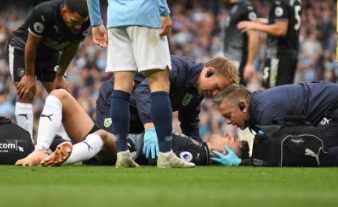Refusal to introduce concussion substitutes ‘dangerous’ and ‘preposterous’

The chair of the All-Party Parliamentary Group into brain injuries has branded football “absolutely preposterous” for its ongoing refusal to introduce temporary concussion substitutes.
As reported on Tuesday by The Telegraph, the International Football Association Board will defy suggestions from Premier League doctors and Fifpro, the world players’ union, to introduce ‘concussion bins’ this year amid fears inside Fifa that they could be exploited for potential sporting advantage.
Rugby has a Head Injury Assessment protocol which allows players to be temporarily removed for up to 10 minutes so that they can be assessed while the game continues. A three minute assessment window was brought in before last summer’s World Cup in football but numerous doctors regard this as insufficient to make a proper assessment. Led by chair Chris Bryant, the All-Party Group for Acquired Brain Injury has called for a single concussion protocol across sports and has particular concerns about football.
“My impression is football is only making progress because they are terrified of litigation,” said Bryant. “I think that is a terrible mistake. Research funding is absolutely minimal in this field.
“It is absolutely preposterous that, although the Football Association and Premier League have made some strides in recent years, Fifa still do not allow subs to come on, as happens in rugby. You need subs to come on because you need 10 minutes to do a proper assessment at the side of the pitch. You can’t do it in three minutes.
“Any ref who thinks it can is living in cloud cuckoo land, and dangerously so. Players often think they know best, coaches often think they know best. Actually the only person who knows best is a doctor. If in doubt, sit them out. We can save lives and we can save people’s brains.”
It is understood that Ifab is waiting for various medical studies to be completed before making a decision on temporary concussion substitutes in the future and a spokesperson said that it was “aware of the ongoing discussion about this topic”.
Dr Michel D’Hooge, the chairman of Fifa’s medical committee, implied that managers would exploit concussion substitutes for tactical reasons when he outlined his opposition to the idea. “I hope you don’t believe that this would be used rightly every time,” he said. Other doctors have told The Telegraph that player welfare must override this concern.
“There’s wide agreement in the medical literature and among medical professionals who routinely do these assessments that a short period of time, such as exists now, is not enough to make a proper assessment,” said Dr Michael Grey, a neuroscientist at the University of East Anglia. “It happens all the time that people have a delayed onset of symptoms. If you suspect a player has a concussion that player should be removed from the pitch immediately and not returned until properly assessed. I don’t think anyone would argue that proper assessment could be done within a few minutes.”
Dr Willie Stewart, who is currently researching the prevalence of dementia among former footballer – a study jointly funded by the FA and Professional Footballers’ Association – has said that it is “unacceptable” that football still does not allow significant time for an assessment to take place.
There were a series of worrying incidents at last summer’s World Cup when even Fifa’s existing protocol – that play should stop for three minutes to assess head injuries and a minimum five-day rest following a concussion – were not routinely enforced.
